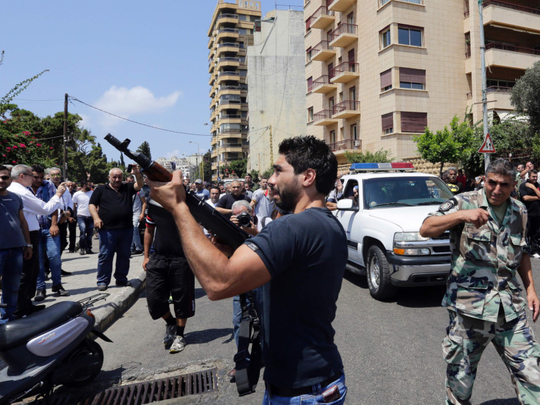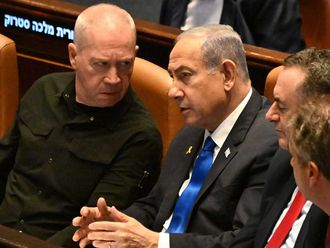
Beirut: As Lebanon commemorated Army Day Monday, Prime Minister Tammam Salam said his government was doing its best to secure the return of nine soldiers kidnapped by Daesh on the northeast border town of Arsal over two years ago.
Salam expressed his “sincere regards and appreciation” for the sacrifices of the Lebanese army, while meeting with some of the troops on Monday.
He also praised “the martyrs who died in their confrontation against the Israeli enemy and terrorist organisations” in a thinly-veiled reference to the Iran-backed militant group Hezbollah.
In December 2015, 16 soldiers were freed by Al Nusra Front and Daesh, but four others were executed.
Since then, a media blackout on the fate of the remaining nine men has been in place and no information has been released until Sunday when Speaker Nabih Berri revealed that eight out of the nine men were alive but one was dead.
Families of the kidnapped soldiers gathered in front of their makeshift tents in Riad Al Solh Square, where they have maintained a vigil for the past two years.
As for the post of army commander (Jean Qahwaji’s term was extended for two years in 2014), Defence Minister Samir Moqbel raised the issues at the cabinet level and sought to extend his term once again when it ends on September 23.
Chief of Staff Major-General Walid Salman and Higher Defence Council chief Major-General Mohammad Kheir, were up for extensions as well, on August 7 and September 30, 2016, respectively.
Moqbel insisted that Salman’s term would not be renewed, which raised several eyebrows though that decision was apparently tied to internal promotions whereas Qahwaji’s was a purely political initiative.
Wiam Wahhab, the leader of the Arab Tawhid Party expressed his support for these extensions on Saturday, a day after his principal Druze rival Progressive Socialist Party Head Walid Junblatt stated his opposition to any new prolongations. “We urge everyone not to include the army in the political disarray,” Wahhab tweeted, because “it is bearing the biggest burden in combating terrorism and securing stability.”
On Friday, Junblatt described extensions of military leaders’ terms as “heresy.”
Interestingly, and even if former Commando Regiment chief Brigadier general Chamel Roukoz retired from the military in 2015, General Michel Aoun was still anxious to see his son-in-law replace Qahwaji.
A few days ago, the Free Patriotic Movement (FPM), let it be known that a Qahwaji extension would trigger a full-scale political war against the government. According to the Al Nahar daily, the FPM intended to turn Prime Minister Tammam Salam’s government into a “caretaker cabinet”, should the term of General Qahwaji go through.
Salam became acting president on May 24, 2014, after the term of Michel Sulaiman ended without the election of a successor, although critical decisions necessitated cabinet approval.












